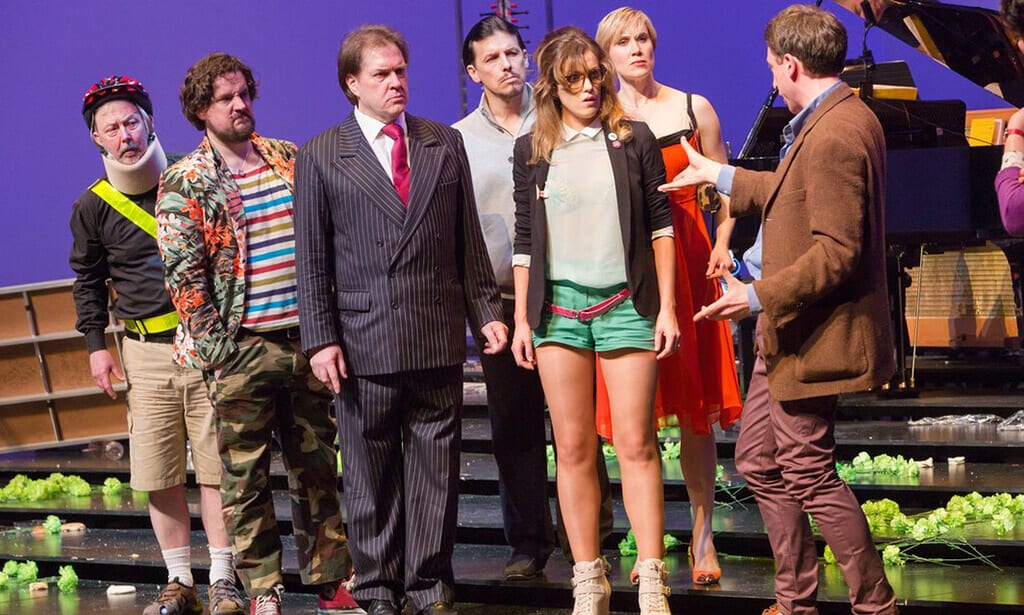Gerald Barry’s opera based on Oscar Wilde’s masterpiece ‘The Importance of Being Earnest’ uses the skeleton of the play beefed-up with wild, bizarre yet brilliant composition of sounds and actions. Judging by the audience many loved it but a few left in a huff at the interval.
Barry maintains Oscar Wilde’s masterpiece through a kaleidoscope of sounds, voices and actions that one may be forgiven in thinking he has gone bonkers. But through that mayhem of sounds one sees Wilde’s characters through a new prism. If compared to visual art I would say he mangled the characters like Lucian Freud’s sketch of a portrait of his sitter.
The text is heavily cut yet all references to food, from the cucumber to the muffins, are there to be used and abused. Although it does not advance the plot, yet it provides opportunities to prod the ridiculous aspects in the mannerism affiliated to certain social classes.
From the outset, rules of orchestration and opera seem to be broken; Britten Sinfonia, the orchestra under the baton of Tim Murray delivers a crisp performance on stage and not in a pit. The ensemble takes part in the narrative, similar to a chorus in a Greek drama. It utters some lines and occasionally repeats lines said by the leading characters. When Lady Bracknell calls ‘Prism’ the orchestra, in unison, calls repeatedly, ‘where is that baby’, undermining and enhancing at the same time, Lady Bracknell’s presence and importance as well as highlighting the absurdity and the humour in the whole handbag story.
That is not all; Alan Ewing’s Lady Bracknell is a man, not a castrato or a man dressed as a woman, but a bass! Ewing wears a grey suit and a tie (the only one on stage). He delivers his part in a thundering bass. Jack’s (Paul Curievici), high tenor reflects his role as the leading romantic male, yet there is no lyrical climax in his role, denuding it of any romance or passion for Gwendolyn. Thanks to Wilde’s lines, Benedict Nelson’s Algernon (baritone) is witty in parts. Gwendolyn Fairfax (Stephanie Marshall), a mezzo who takes control of her own destiny, towering over her mother, Lady Bracknell by occasional chastising. Cecily Cardew, superbly performed by the soprano Claudia Boyle dominates the ensuing drama. Dressed in shorts and almost see-through matching shirt, she strides across the stage with a teenager’s confidence, comfortable in her own setting. Her brilliant range of high and low notes transforms Wilde’s Cecily’s character from a naïve young woman to confident and headstrong teenager adamant to get what she wants. She towers over Gwendolyn.
Barry’s composition forges a new path in which operatic conventions are misplaced and distorted letting the sound of over 40 dinner plates smashed at a regular intervals, compress the pause in between words exchanged over a megaphone by Boyle’s Cecily and Marshall’s Gwendolyn. The two ladies standing on boxes, like politians of opposing parties, amplify their argument as to whom Ernest is engaged. The whole scene swirls from instrumental and vocal vortex where the ridiculous and the absurd compete with foot thumping, strings and wind instruments quarrel and talk at each other rather than to each other.
This opera is an interesting take on a perfect masterpiece. Barry cannot improve it but with Wilde’s brilliant text, he dismantles some established operatic conventions and creates a new order in the disorder of his creation.
The frivolity in some of the performances overcasts the intricacies of the composition. Ramin Gray’s direction leans towards the frolicking rather than promoting a balance between the ironic and the absurd.

